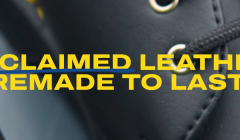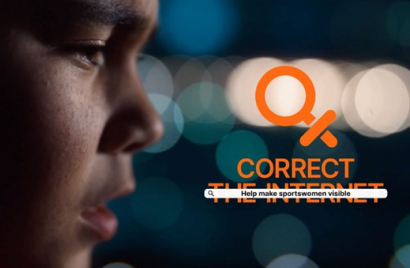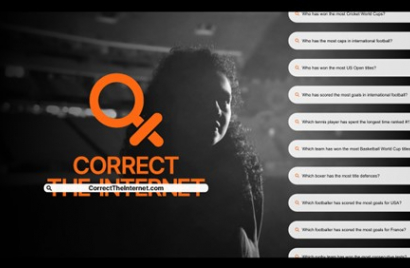
Dr. Martens champions sustainable fashion
Genix Nappa, a new material made of leather offcuts, aims to reduce waste

The reality of virtual barriers for Women’s football highlighted in new campaign

Who has scored the most goals in international football? The internet will tell you it’s Cristiano Ronaldo, but in actuality, women’s footballer Christine Sinclair has scored more goals. This is why ‘Correct The Internet’ is on a mission to make women’s sports more visible and ensure that the internet recognises the achievements of female sportspeople.
The ‘Correct The Internet’ campaign has been created in partnership with DDB Aotearoa NZ, an international group that seeks to highlight and correct inaccuracies in internet search results. The inconsistency of searchable facts disadvantages sportswomen, therefore the global campaign launched in January 2023 to make sportswomen more visible at the NZ Football Ferns game against the USA women’s team. The inspiring work aims to help the world recognise all sporting heroes and empower the next generation of sportswomen.
At the heart of the campaign is a moving video that features a small child asking a football stadium of Alexas who has scored the most goals in international football. Overwhelmingly the robot voices reply with ‘Christiano Ronaldo’ but the young girl knows the answer to be Christine Sinclair and powerfully challenges the Alexas. The use of the young girl as the lead of the campaign is extremely powerful as the dismissal of female achievements on the internet is detrimental to the next generation.
“Many of the world’s leading athletes are women. Many of the world’s sporting records are held by women. But when people search online for factual sporting information about athletes, the results favour the sportsmen, even when the sports women have greater statistics,” says Rebecca Sowden, a former New Zealand Football Fern and founder of international women’s sports marketing and sponsorship consultancy, Team Heroine.
This empowering campaign demonstrates the need for wider conversations on more inclusivity in all sports. The Women’s Euros 2022 captured audiences of over 365m, across 195 territories and a record-breaking final with 87,192 attendees. A game-changing tournament with over 400,000 new opportunities created for girls and women to engage in grassroots legacy football activities but what’s next for the positive progression of the women’s game? The success of the lionesses must not be in isolation and more can be done to keep the ball rolling and inspire the next generation.
The record-breaking attendance at last year's Euros tournament shows how far the game has come but the fight for equal pay within the game and overall better exposure for women’s teams is ongoing. It was recently announced that Wales international men’s team will take a 25% pay cut to enable a 25% rise for female players under an agreement with the Football Association of Wales (FAW). The agreement with the governing body, FAW, comes into effect immediately and will cover up to the 2026 Fifa men’s World Cup and the women’s tournament a year later - a story which shows that change is possible but that remains uncommon. Such a crucial deal shows the unity within the Welsh world of professional football and should pave the way for other clubs to follow in the fight for change.
While this shows there are steps towards equal pay being made, there is still much to do in other areas of the game online. Search engine results are vital in the perception of sport and ‘Correct The Internet’ is striving to tackle an area often forgotten but that is imperative to increase awareness of the women’s game.
Search engines tend to focus on what is made popular by known publishers, social media platforms and content creators and therefore search results can reflect certain users or organisations' preferences. Yet not only is it degrading for sports women to have achievements like highest goal scorer ignored, but the information is also simply incorrect. Search engines are exhibiting gender biases that need to be recognised and perpetuating stereotypes that women have to face in society every day. Correct The Internet is working to break down the barriers women face every day and that have managed to seep into the virtual world.
With its aim to empower women through the power of sport, Correct The Internet has set the standard of what can be achieved through a campaign that is unafraid to make a statement. It stands for gender equality and empowers all women and girls and their achievements.
The only way to correct the algorithm is through the power of the people and Correct The Internet wants to empower people to help ensure accurate information is delivered to all of us.
Shaunagh Brown, English rugby’s Red Roses’ player
The campaign has gathered the support of many well-known international athletes including English rugby’s Red Roses’ player, Shaunagh Brown, and Football Fern Meikayla Moore. Other high profile supporters include organisations such as Women In Sport Aotearoa, Women Sport Australia and New Zealand Football.
Shaunagh Brown said “The only way to correct the algorithm is through the power of the people and Correct The Internet wants to empower people to help ensure accurate information is delivered to all of us. Let’s do this for future sports people everywhere.”
There is no easy way to correct the inconsistencies in search results. However, if there is a push to correct these issues by reporting them using each search engine’s inbuilt feedback function, they can be logged and fixed. The issue is that many people remain unfamiliar with the feedback function and some recent design changes on some of the larger search engines make the tool harder to find. So, the team behind Correct The Internet has created a tool that makes sending feedback easy for anyone to execute with just a couple of clicks.
The tool is hosted on Correct The Internet website and feedback can be sent through the site notifying them of incorrect search results and providing the correct information. Over time, the aim is to find and correct as many incorrect search results as possible using this tool and the collective power of the people.
The work by DDB Aotearoa NZ is a large step in the right direction but there’s still a long way to go. With the FIFA Women’s World Cup fast approaching and set to be the best one yet, there couldn’t be a better time for this campaign. As New Zealand will be hosting this year’s Women’s World Cup and internet searches will likely be at an all-time high, Correct The Internet is doing vital work to ensure the results in our searches reflect the facts and not perpetuate historic biases.


Q: Who has scored the most goals in international football?
A: The internet says Cristiano Ronaldo with 118 goals
The stats say: CHRISTINE SINCLAIR with 190 (Canada)
Q: Which tennis player has spent the longest time ranked number 1?
A: The internet says Novak Djokovic with 373 weeks
The stats say: STEFFI GRAF with 377 (Germany)
Q: Which team has won the most Basketball World Cup titles?
A: The internet says United States/Yugoslavia with 5 titles each
The stats say: THE USA WOMEN’S TEAM with 11 (US)
Q: Who has scored the most tries in rugby world cups?
A: The internet says BRYAN HABANA and JONAH LOMU with 15 tries
each
The stats say: PORTIA WOODMAN (NZ) with 20 tries
Q: Who has won the most cricket world cup titles?
A: The internet says THE AUSTRALIAN MEN’S TEAM 5 titles
The stats say: THE AUSTRALIAN WOMEN’S TEAM with 6 titles
Q: Which New Zealand golfer has won the most majors?
A: The internet says MICHAEL CAMPBELL and BOB CHARLES with 1
major each
The stats say: LYDIA KO with 2 majors
Q: Which footballer has scored the most goals for USA?
A: The internet says CLINT DEMPSEY and LANDON DONOVAN with 57
goals each
The stats say: ABBY WAMBACH with 184 goals
Q: Who is the youngest footballer to play in a world cup final?
A: The internet says PELÉ 17yrs, 249 days
The stats say: BIRGIT PRINZ: 17yrs, 239 days
Disclaimer: The above reflects search engine results as of the date of this media release, however, as mentioned, internet results are inconsistent and can change depending on who is searching.
Looks like you need to create a Creativebrief account to perform this action.
Create account Sign inLooks like you need to create a Creativebrief account to perform this action.
Create account Sign in